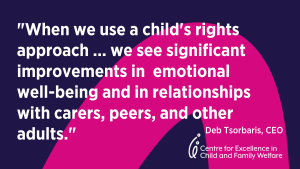A child centred approach is the key to better outcomes
04 Aug 2023

Children’s Rights and Children’s Voices must become “business as usual” in the child services sector and throughout government, says The Centre CEO Deb Tsorbaris.
She says it’s time for a national conversation to highlight how to implement a child-rights approach across government and services, as well as how to incorporate children’s experiences and voices into every decision and action that affects them now and in the future.
The Centre’s inaugural seminar on amplifying our children’s voices and rights in July brought together a variety of perspectives reflecting the many unique and individual experiences of children.
Speakers included Howard Choo, Australian Policy and Advocacy Lead at Save the Children and 54 Reasons, who shared the Child I View child rights practice framework, and Kathryn Joy and Professor Eva Alisic from the University of Melbourne, who shared insights from their research on the lived experience of children who have lost a parent to domestic homicide.
According to Ms Tsorbaris, the event will become an annual vehicle for the sector to continue sharing research, evidence, and best practice, debate and discuss, and advocate for a child centered approach to policy and practice.
Australia has signed the Convention on the Rights of the Child, which establishes the civil, political, economic, social, and cultural rights of all children, regardless of race, religion, or abilities.
Ms Tsorbaris says these are the guidelines for a whole of government move toward child-centred policies, services, and systems.
“It is all too easy to get caught up in crisis events, details, and immediate needs, and we must work hard to remember the bigger picture, which tells us that a lot is going on in a family before they reach a crisis event.”
“There are often many touch points – in health services, workplaces, educational settings, and child protection and family services – where we can start early to listen to the children and consider their voices and rights,” she says.
Children are sometimes “along for the ride and not always treated as victim-survivors or primary service clients in their own right” when it comes to support.
“We must ensure that the voices of children are heard and taken seriously and that they become a central consideration across all levels of government,” she says.

Australia has a very compartmentalised approach to ‘children’s issues,’ which means that children and their rights are frequently left out of larger policy discussions.
The government must shift its focus from passive, crisis-based interventions to a broader approach that addresses the underlying causes of family breakdown and child maltreatment throughout society.
“Rights violations are a daily reality for many children in Australia, and it has to change for all children, not just some.”
The Centre promotes collaboration with children by incorporating children’s lived experiences into its evidence-based training for the Victorian children, young people and family services sector.
“When we use a child’s rights approach in practice, we see significant improvements in children’s and young people’s emotional well-being, as well as better relationships with their carers, peers, and other adults in their lives.”
When applied at the policy level, a child centered approach improves engagement with schools and the community, and programs are better designed, implemented more successfully, are more outcomes-focused, and ensure children’s voices and experiences are valued.
For more information and to view recordings of the seminar visit The Centre’s OPEN project here
Related articles
Last updated: 04 Aug 2023



